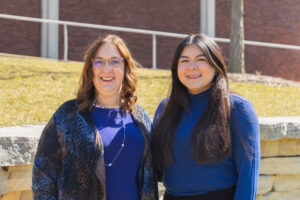Disability Services
Luther College Disability Services provides access to an equitable educational experience for students. Our office manages academic, housing, and dining accommodations.

Pictured L to R: Accessibility Services Team: Dr. Ann Smith, Asst. Dean of Student Success & Dir. of Dis. Services & Ms. Delaylah, Sanchez, Accommodations Coordinator
We are happy to work with you to determine what accommodations will help you be successful at Luther. Each student’s accommodation is individual and tailored to their specific needs.
What Informs Our Work
The work of Disability Services is informed by federal legislation of the Americans with Disabilities Act (ADA) laws, Section 504 of the Rehabilitation Act of 1973 and Iowa law. The department works to integrate best practices in the area of Disability Services in accordance with the Association on Higher Education and Disability.
All students with disabilities are eligible for protections under the Americans with Disability Act Amendments Act (ADA AA) of 2008 and a Section of the Rehabilitation Act of 1973 (as amended). Under the ADA AA 2008, a disability is defined as “a physical or mental impairment that substantially limits one or more major life activities, having a record of such an impairment, or being regarded as having such an impairment.”
Request Accommodations
Students with disabilities requesting accommodations and services at Luther College must complete an application process and be determined eligible as a student with a disability prior to the development of an accommodation plan. This process includes the student’s self-disclosure, intake interview, and timely submission of detailed documentation of a disability.
Determine Eligibility
If you are looking to determine if you are eligible for accommodations through Disability Services, please complete the Request an Accommodation form. Once this form is completed, a member from the Disability Services team will reach out to you via your Luther email to set up a meeting time.
Transitioning from High School to College
The Center for Academic Enrichment and Disability Services is here to discuss any of the above concerns with transitioning from high school to college.
Key Differences Between Secondary and Post-Secondary Education and Disability
High School
- Students with disabilities are identified by the school districts
- Information is shared with parents/guardians
- Placement and accommodations include parents/guardians
- Eligibility for services is diagnosis driven
- Special Education teachers know you well and are aware of your specific difficulties or concerns, and know your strengths and weaknesses
- School district structures a student’s weekly schedule
- Teachers remind students of exam dates and assignment deadlines
- Students are disciplined for skipping class
- Time spent in classroom averages about 40 hours per week
- Time spent on homework is oftentimes substantially less than in college
- Preparing for exams usually involved memorization and identification of information
- Tutors and/or extra instruction is provided by teachers
- Instructors might retroactively change grades by allowing a student to retake an exam
- Courses and programs can be fundamentally altered
College
- Students must self-identify by registering with the Disability Services office
- Student’s right to privacy and confidentiality is upheld
- Placement and Accommodations do not include parents/guardians
- Eligibility for services is driven by severity and impact on major life activity(ies)
- Students must initiate discussion and make your concerns know to college instructors, advisors, and disability resource facilitators
- Student is responsible for their own time management
- Students are expected to know exam dates and assignment deadlines by referring to their syllabi
- Students are not disciplined for skipping class
- Time spent in classroom is approximately 13–16 hours per week (don’t let this fool you!)
- Time spent on homework is usually 2 hours for every hour you spend in class
- Preparing for exams will involve application of information
- Students must seek out their own tutors to get more information on specific content information
- Grades aren’t usually retroactive
- Courses and programs are not fundamentally altered